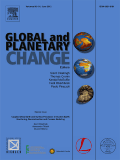
GLOBAL AND PLANETARY CHANGE
metrics 2024
Illuminating the Path to Global Environmental Solutions
Introduction
GLOBAL AND PLANETARY CHANGE, published by Elsevier, is a premier international journal focused on the critical issues surrounding environmental science, climate change, and planetary dynamics. Since its inception in 1989, this journal has established itself as a leading voice in the field, currently holding a prestigious Q1 ranking in both Global and Planetary Change and Oceanography as of 2023. With a remarkable influence reflected in its Scopus rankings—15th in Earth and Planetary Sciences and 34th in Global and Planetary Change—it serves as an essential platform for researchers, professionals, and students. The journal provides a comprehensive examination of cutting-edge research findings and innovative developments that address the urgent challenges facing our planet. Although it is not an Open Access journal, it remains a vital resource for anyone keen to contribute to or stay informed on the ever-evolving discourse of global environmental change, promoting sustainable solutions for the future.
Metrics 2024
 1.49
1.49 4.00
4.00 4.50
4.50 163
163Metrics History
Rank 2024
Scopus
IF (Web Of Science)
JCI (Web Of Science)
Quartile History
Similar Journals
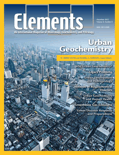
Elements
Transforming Discoveries into Knowledge for TomorrowElements is a premier academic journal published by the Mineralogical Society of America, dedicated to advancing knowledge in the fields of Earth and Planetary Sciences and Geochemistry and Petrology. Since its inception in 1973, this journal has established itself as a leading source of impactful research, evidenced by its prestigious Q1 rankings in both categories in 2023, placing it among the top journals globally with Scopus ranks of #18 and #23, respectively. Elements is uniquely positioned to foster interdisciplinary dialogue, offering a platform for groundbreaking studies that explore the fundamental processes shaping our planet. Although it operates without an open access model, its rigorous peer review process guarantees the integrity and quality of published work, making it an essential resource for researchers, professionals, and students eager to stay abreast of the latest developments in mineralogy and earth sciences. With a commitment to excellence, Elements continues to push the boundaries of our understanding of geological phenomena and their implications for both science and society.
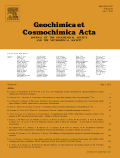
GEOCHIMICA ET COSMOCHIMICA ACTA
Transforming Geochemical Research into Global ImpactGEOCHIMICA ET COSMOCHIMICA ACTA is a premier journal dedicated to advancing the fields of geochemistry and petrology, published by Pergamon-Elsevier Science Ltd. With its ISSN 0016-7037 and E-ISSN 1872-9533, this esteemed journal has been at the forefront of scientific inquiry since its inception in 1950, with a strong commitment to disseminating high-quality research through 2024. Its reputation is underscored by an impressive impact factor and a ranking of #8 out of 154 in Earth and Planetary Sciences according to Scopus, placing it in the 95th percentile of its category. GEOCHIMICA ET COSMOCHIMICA ACTA serves as a critical resource for researchers, professionals, and students alike, offering insights into the complex interactions of geological and cosmological processes. While the journal is not open access, it remains a vital conduit for innovative research, fostering the scientific community’s understanding of earth materials and their significance.

Frontiers of Earth Science
Connecting Researchers to the Frontiers of DiscoveryFrontiers of Earth Science is a prominent academic journal in the field of Earth and Planetary Sciences, published by Springer. With an ISSN of 2095-0195 and an E-ISSN of 2095-0209, this journal serves as a significant platform for researchers and professionals to disseminate their findings from 2007 to 2024. It is recognized for its impactful contributions within the category of Earth and Planetary Sciences, boasting a respected Q2 ranking in 2023. With a Scopus ranking of 64 out of 195, placing it in the 67th percentile, Frontiers of Earth Science continues to drive academic dialogue and innovation. The journal is dedicated to exploring a diverse range of topics, including geology, meteorology, and environmental science, and amplifying the understanding of Earth systems through rigorous research. Located in New York, USA, this journal embraces an Open Access model, ensuring that groundbreaking research is readily available to the global scientific community, thereby enhancing its accessibility and impact.

Earth System Dynamics
Illuminating Interactions: Research at the Heart of Earth ScienceEarth System Dynamics is a premier academic journal dedicated to advancing our understanding of the intricate interactions within the Earth system, encompassing atmospheric, hydrological, geological, and biological processes. Published by COPERNICUS GESELLSCHAFT MBH in Germany, this Open Access journal has been fostering scholarly communication since its inception in 2010, allowing unrestricted access to vital research findings. With an impressive Impact Factor and a ranking of #7 out of 195 in the field of Earth and Planetary Sciences, as well as being categorized in the Q1 quartile, Earth System Dynamics stands at the forefront of its discipline. Researchers, professionals, and students alike benefit from its comprehensive scope, which covers various aspects of Earth system science and its implications for climate change and sustainability, making it an indispensable resource for anyone invested in the environmental challenges of our time. As the journal continues to converge remarkable insights up to 2024, contributors and readers alike are encouraged to engage with this vital ongoing conversation.
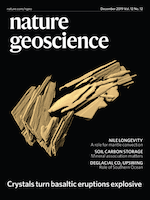
Nature Geoscience
Connecting Research to Global Challenges.Nature Geoscience, a premier journal published by NATURE PORTFOLIO, provides a platform for the dissemination of high-quality research in Earth and Planetary Sciences. With an impressive impact factor reflecting its significance — ranking in the 99th percentile and positioned at #1 out of 195 in Scopus Ranks within its category, this journal is a leading authority in its field. Since its inception in 2008, it has fostered interdisciplinary collaboration, addressing critical challenges such as climate change, natural disasters, and resource management. Although it does not offer Open Access, the journal is accessible through various research libraries, ensuring that vital findings reach a broad audience. The journal's esteemed reputation in the Q1 quartile of Earth and Planetary Sciences makes it an essential resource for researchers, professionals, and students aiming to advance their understanding of geoscientific phenomena.

Geochemical Perspectives Letters
Fostering dialogue in the dynamic world of geochemistry.Geochemical Perspectives Letters, published by the European Association of Geochemistry, is a leading open-access journal that has been at the forefront of geochemical research since its inception in 2015. Based in France, this journal is dedicated to disseminating high-quality, original research and reviews across the fields of Environmental Chemistry, Geochemistry, and Petrology, and Geology. With an impressive Q1 ranking in multiple categories, and notable Scopus rankings placing it among the top-tier journals in Earth Sciences, Geochemical Perspectives Letters aims to foster scientific dialogue and collaboration among researchers and professionals. Its open-access model ensures widespread dissemination of knowledge, making it accessible to a diverse audience, including students and seasoned experts alike. As the journal continues to converge research insights from 2015 to 2024, it remains a pivotal resource for those striving to understand and address the complexities of our planet's geochemical processes.
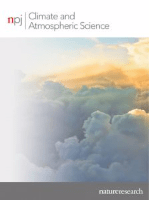
npj Climate and Atmospheric Science
Advancing climate knowledge for a sustainable future.npj Climate and Atmospheric Science, published by NATURE PORTFOLIO, is a premier Open Access journal dedicated to advancing the understanding of climatic and atmospheric phenomena. Since its inception in 2018, this journal has positioned itself as a leader in its field, achieving Q1 ranking in 2023 across key categories such as Atmospheric Science, Environmental Chemistry, and Global and Planetary Change. With a Scopus rank of #23 out of 148 in Earth and Planetary Sciences and a commendable percentile ranking, npj Climate and Atmospheric Science serves as an essential platform for disseminating high-quality research, fostering interdisciplinary collaboration, and addressing critical global challenges. Its open access policy ensures that vital research findings are available to a broad audience, facilitating scholarly engagement and innovation. Researchers, professionals, and students in the fields of environmental science and climate studies will find this journal a valuable resource for cutting-edge studies and transformative insights.

Geosciences
Advancing Knowledge in Earth and Planetary Sciences.Geosciences is a prestigious open-access journal published by MDPI, dedicated to advancing research in the field of Earth and Planetary Sciences. Since its inception in 2011, this journal has fostered a collaborative environment for the dissemination of innovative ideas and findings, contributing significantly to the academic community's understanding of complex geological processes. The journal has achieved a commendable 2023 ranking in the second quartile (Q2) within its category, highlighting its impact and relevance in the field, with a Scopus rank of #41 out of 195 journals, placing it in the 79th percentile. With an aim to span a broad range of topics from environmental geology to planetary exploration, Geosciences is pivotal for researchers, professionals, and students looking for an accessible platform to share their work and stay informed of the latest developments. As a fully open-access journal, it ensures that high-quality research is freely available, fostering greater dissemination of knowledge across the globe.
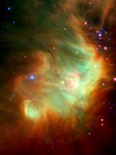
Annual Review of Earth and Planetary Sciences
Advancing Knowledge in Earth and Planetary SciencesAnnual Review of Earth and Planetary Sciences is a leading scholarly journal published by Annual Reviews, dedicated to advancing our understanding of the dynamic processes governing the Earth and its celestial companions. With ISSN 0084-6597 and E-ISSN 1545-4495, this esteemed journal, established in 1976, has consistently provided comprehensive reviews that synthesize cutting-edge research across various disciplines, including astronomy, astrobiology, geology, and planetary science. Notably, the journal has achieved a remarkable position in the academic landscape, ranking in the Q1 quartile across multiple categories, including Astronomy and Astrophysics and Earth and Planetary Sciences, with Scopus rankings placing it at the forefront of these fields. The journal's commitment to facilitating open access to critical scientific advances, though not fully open, allows for maximum reach within the research community. Researchers, professionals, and students alike can benefit from the high-impact articles designed to foster collaboration and innovation within the fields of earth and planetary science.
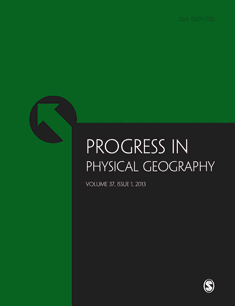
Progress in Physical Geography-Earth and Environment
Exploring the dynamic intersection of Geography and Planetary Science.Progress in Physical Geography-Earth and Environment is a premier academic journal published by SAGE Publications Ltd, renowned for its contributions to the fields of Earth and Planetary Sciences and Geography. With a distinguished history spanning from 1977 to 2024, this journal maintains a robust Q1 classification in both Earth and Planetary Sciences and Geography, Planning and Development, reflecting its high impact and rigorous scholarly standards. As evidenced by its Scopus rankings, it stands at the forefront of research, positioned in the 89th percentile among leading journals. Progress in Physical Geography aims to facilitate the exchange of innovative research, insights, and methodologies, making it an essential resource for researchers, professionals, and students dedicated to understanding and shaping the natural environment. While currently not designated as an Open Access journal, the wide accessibility of its content, combined with its significant impact factor, underscores its importance within the academic community seeking to advance knowledge and application in geography and environmental sciences.